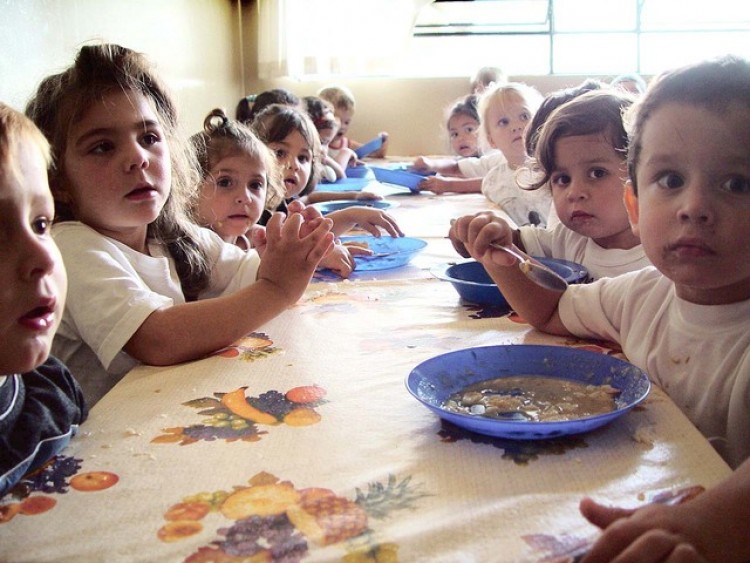
Our dependence on food starts at birth – without it, we die. But, food is not only needed to sustain life, it is also relied on to build attachment. An infant has few needs in the first few months of life – comfort, sleep, food, repeat. Typically an infant cries when hungry, and that need is met by the mother immediately tending to the infant and not only feeding, but creating a comfortable and nurturing environment while feeding. The child is comforted, and moves on, only to repeat the cycle, and have the need met again. The child not only gets nourishment, but builds a healthy attachment as well – a trust and reliance that when they cry, they will be helped. Unfortunately, the cycle of attachment is often broken very early on with orphans, as their needs are not immediately met, and their cries are not always answered. They cry with hunger, and are sometimes not tended to. Or, other times, they are fed with a propped up bottle or are not fed fully. Sadly, nurturing does not come hand in hand with feeding of orphaned infants. Herein begins not only challenges with attachment, but challenges with food as well.
Abandoned older children most likely have faced even more challenges associated with food – poverty, hunger, starvation, lack of food while in care, etc. This can cause the child to establish unhealthy food and eating habits. And can also develop an unhealthy obsession with food and eating.
Many adopted children face food challenges such as hoarding, stealing, hiding, over-eating, and binging (fast eating in combination with over-eating). These behaviors can stem from many things – need for control, history of a lack of food, attachment challenges, etc. Many parents feel overwhelmed by these behaviors, as well as pressure to make sure that their newly adopted child is eating a balanced diet. There are numerous steps that parents can take in order to help their child develop healthier food habits.
- Create a healthy ‘snack shelf’ in the refrigerator and pantry. Explain to your child that they may take foods from these areas at any time. Stock them with fruits, veggies, low calorie snacks, etc. This will give your child the comfort of knowing that food is always, and will always, be available to them (most likely a new notion for your child).
- Never use food as a reward, bribe, or punishment. You child has challenges with food for a reason. Food is a basic human right that your child finally has – it would be detrimental to use that against him or her.
- Choose your battles - remember that it is your job, as the parent, to ensure that your child is eating a healthy diet. Does that mean that they must finish all the food on their plate at mealtime? No. If mealtime is challenging for your child, remember that your child has all day to consume a healthy diet. If they prefer eating small amounts throughout the whole day, that is fine. Food should never be a source of stress for your child.
- Never shame your child for hoarding, stealing, or hiding. Along the same lines as the ‘healthy shelf,’ if it gives your child comfort to keep food in their room, let them. Acknowledge it, and help your child choose appropriate snacks to have on hand in their room.
- Bottles – remember that your child may have never experienced the mother-infant bonding that is crucial to emotional development. It is sometimes beneficial to ‘purposefully regress’ your child, and allow them to be the infant that they were never able to be. So your five year old wants you to rock her with a bottle at bedtime? Do it. It will not last forever, and the benefits of bonding will (typically) outweigh any concerns of inappropriate ‘babying.’
Parenting an adopted child is different than parenting a biological child. Whether the child was adopted at birth, or at an older age, this is true. What may have worked for your biological child (or your niece, or even for you as a child) may or may not work for an adopted child, and should not be expected to. So your own Mom always insisted you ‘finish your dinner!’ She had good intentions, and she may guffaw at your (in her eyes) ‘lack of parenting’ in not forcing your adopted child to finish every last morsel. But what all parents can agree on, is that you must wisely choose your battles for your specific children. If your child has issues with food (whether it is due to attachment, or control, or otherwise), forcing eating or restricting food is never the answer. Take it one day at a time, and as long as your child has consumed healthy food, and a healthy amount of food for the day, consider it a win!
And always remember, you are doing a good job :).
Living Hope Adoption is a Christian adoption agency, granted full Hague Accreditation, located in Pennsylvania. We are staffed by an enthusiastic and caring team of professionals committed to providing you with all of the international adoption services you need. Adopting a child is a big step for anyone to take, and our staff takes pleasure in providing future parents support and guidance to make the transition of becoming a family as smooth as possible. Living Hope offers home study and post placement services to families within our direct service area who have adopted internationally. Our purpose is simple: to provide homes for children who need a future, and do it with a level of care and compassion that goes well beyond one's expectations.